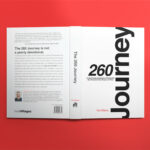
Day 74
Today’s Reading: John 6
The Christian life is a journey, not an arrival. As part of that journey, we all have to do hard but noble stuff at some point:
• tell someone about Jesus
• say no to something we used to say yes to
• end a toxic relationship
• decide to tithe
As Oswald Chambers said, “If we are going to live as disciples of Jesus, we have to remember that all noble things are difficult. The Christian life is gloriously difficult, but the difficulty of it does not make us faint and cave in, it rouses us up to overcome.” Sometimes the hardest thing and the right thing are the same thing. Don’t miss out on something amazing because it’s difficult. We are ordinary people who know an extraordinary God!
Talk about doing the hard thing: In October 1912, Theodore Roosevelt was campaigning for the presidency and on a stop in Milwaukee, Wisconsin, a man shot him point-blank with a .32-caliber pistol. Though the bullet lodged in his chest, Roosevelt refused to cancel his campaign rally. “The bullet is in me now, so that I cannot make a very long speech, but I will try my best,” Roosevelt told the crowd. In fact, Roosevelt spoke for eighty-four minutes! That’s doing the difficult thing!
In today’s reading, John 6 helps us get ready for the hard thing that God sometimes calls us to. It’s the story of the loaves and fishes. It’s not a story simply about a miracle. It’s a test for the disciples! It’s them being challenged with a hard thing. Let’s read it:
After these things Jesus went away to the other side of the Sea of Galilee (or Tiberias). A large crowd followed Him, because they saw the signs which He was performing on those who were sick. Then Jesus went up on the mountain, and there He sat down with His disciples. Now the Passover, the feast of the Jews, was near. Therefore Jesus, lifting up His eyes and seeing that a large crowd was coming to Him, said to Philip, “Where are we to buy bread, so that these may eat?” This He was saying to test him, for He Himself knew what He was intending to do. (John 6:1-6)
This story wasn’t just about feeding people, it was also about testing the disciples with a one-question test: “Where shall we buy bread for all these people to eat?”
That’s it.
It was “fill in the blank.” (I hated those tests because you had no chance to guess, like you could on the multiple-choice tests.)
If Jesus would have said something like . . .
“Where shall we buy bread for all these people?”:
A. Costco
B. Sam’s
C. a and b
D. Me!
I think I could have gotten this one right.
Philip started filling in his test paper: “Two hundred denarii worth of bread is not sufficient for them, for everyone to receive a little.”
Wrong!
Then it was Andrew’s turn: “There is a lad here who has five barley loaves and two fish, but what are these for so many people?” (verse 9).
When Andrew started his answer with, “There is a lad here who has five loaves and two fish,” I want to shout, “Stop right there! You got it. Don’t say anything else.” If he would have ended his sentence there, he would have been a hero. But he threw in, “But what are these for so many people?”
He should have stopped at the fish.
When he continued to talk, he magnified the crowd and lessened God. He was minimizing the material God had to work with. From the beginning, God has never had much to work with. But that’s what happens when our problems
get big: God gets little.
Andrew was so close to the answer. In fact, he got the answer right, but then messed it up with the conjunction but.
When you are faced with a huge need, just tell God all the stuff you’ve got and what He has to work with. Tell God what you’ve got—then stop there!
“I’ve got two mad people in a marriage. That’s it, God.”
“I’ve got a job that doesn’t pay much and a lot of bills. That’s all, God.”
“I’ve got a rebellious child who won’t listen.”
Just tell God what you’ve got to work with, then say, “The rest is up to you, Lord.”
Let’s look at how Jesus responded:
Jesus said, “Have the people sit down.” Now there was much grass in the place. So the men sat down, in number about five thousand. Jesus then took the loaves, and having given thanks, He distributed to those who were seated; likewise also of the fish as much as they wanted. (verses 10-11)
Don’t tell God their value or whether something is enough. He made the world from nothing. God doesn’t need your commentary. The only word that should go after but is God. And God’s got it from there.
